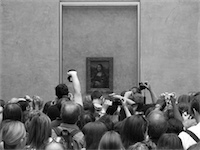How photography can affect your memory (if you aren’t paying attention)
posted Tuesday, December 10, 2013 at 2:20 PM EDT

A research article just published in the journal Psychological Science has shown an interesting impact on people's memory if they photograph an event rather than simply observing it — but what the paper doesn't say is that if you break out the camera, you're won't remember what you've just been doing.
The study is titled "Point-and-Shoot Memories: The Influence of Taking Photos on Memory for a Museum Tour" and was looked exclusively at a very small set of circumstances: people were taken on a guided tour of a museum, and photographed some items, and not others. What the study showed was that if the person took just an image of each subject as a whole, they remembered less about its details and its placement in the museum than if they had only looked at it. But there's more going on here, with what's been dubbed a "photo-taking-impairment effect." Conversely, if the photographer zoomed in on details of the work, their memory for the object — both the zoomed in detail and as a whole — was just as good as if they hadn't used the camera at all.
This paper has been used to generate some rather bombastic headlines, which miss much of what the actual information in the research seems to say (or at least what we can garner from reading the abstract). Here's a key part of the abstract, with emphasis added:
If participants took a photo of each object as a whole, they remembered fewer objects and remembered fewer details about the objects and the objects’ locations in the museum than if they instead only observed the objects and did not photograph them. However, when participants zoomed in to photograph a specific part of the object, their subsequent recognition and detail memory was not impaired, and, in fact, memory for features that were not zoomed in on was just as strong as memory for features that were zoomed in on. This finding highlights key differences between people’s memory and the camera’s “memory” and suggests that the additional attentional and cognitive processes engaged by this focused activity can eliminate the photo-taking-impairment effect.
In other words, by the act of zooming in, of composing a shot rather than just firing off a quick snap, the person is mentally engaging with the artwork, fixing it in their mind — much as they would by just observing the museum. If you just walk around taking the same drab photo of every single item in the museum, you're not going to remember anything. But if you actively compose and consider each object, it sticks in your memory.
So no, taking photos isn't going to make you forget what you've just done — just put some thought into when you pull out your camera, and the hows and whys of taking a photo.
(via Reddit)
Image by Giorgio Galeotti on Flickr, used under Creative Commons license